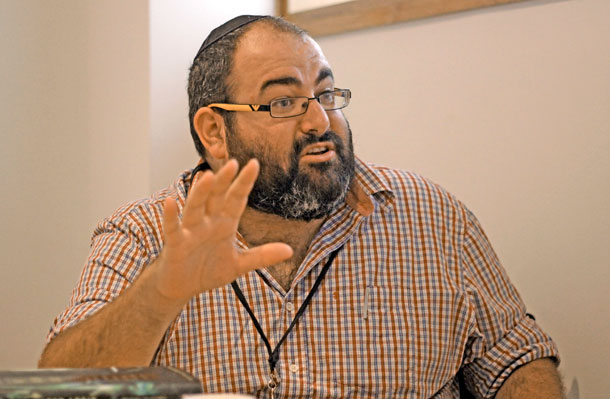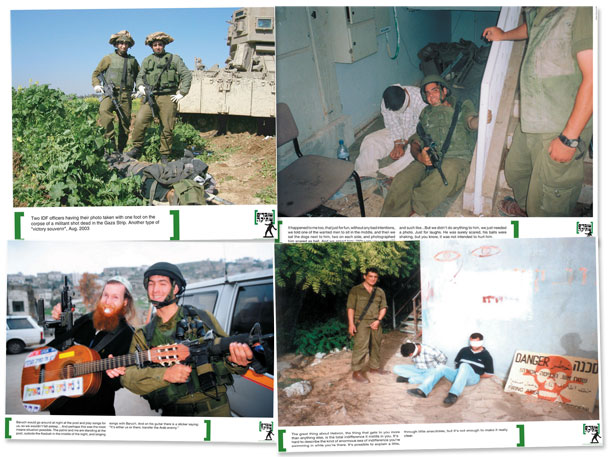4 August 2014 Edition
Breaking the Silence
Israeli Army combat veteran – and Zionist – speaks out against the Occupation

• Yehuda Shaul speaks to An Phoblacht in Dublin
The former company sergeant in an Israeli Army combat unit says part of the problem is the media portrayal of the Occupation as some kind of conflict
YEHUDA SHAUL was born in Jerusalem in 1982. The son of an American-born father and Canadian-born mother who immigrated to Israel following the 1973 Arab-Israeli ‘Yom Kippur War’, at the age of 18 he was drafted into the Israeli Army for the mandatory three years’ national service. He served as a combat soldier and later a company sergeant right across the occupied West Bank.
Yehuda says that during his time in the West Bank he saw nothing wrong with following orders that required the bursting into family homes in the middle of the night, arresting people and running checkpoints on occupied territory. He says it’s in the West Bank that soldiers saw Palestinians not as human beings but as enemies or potential terrorists.
It was only towards the end of his tour that he began to think there was something wrong and immoral about what he and his fellow soldiers had done.
In 2004, after his service had ended, he and several other combat veterans founded ‘Breaking the Silence’ to educate the Israeli public on the realities of the Occupation and what is being done in their name.
Breaking the Silence says it “endeavours to stimulate public debate about the price paid for a reality in which young soldiers face a civilian population on a daily basis, and are engaged in the control of that population’s everyday life”.
Now the organisation consists of almost 1,000 ex-combatants who served from the beginning of the Second Intifada (Palestinian Uprising) until today; some are still serving personnel.
Yehuda is in Ireland to host a photo exhibition at the Gallery of Photography in Dublin’s Temple Bar with the support of Trócaire and Christian Aid.
“We’re not pacifists,” stresses Yehuda. “We think our military should be an instrument of defence, not one of occupation.”
He describes in detail one of the first introductions new Israeli Army recruits get when they are deployed in the Occupied Territories.
“One of the things we do is mock arrests. The first time a unit is deployed you don’t want the first arrest they carry out to be the real thing, so you choose the most peaceful and quiet Palestinian village in the area – open the aerial photo of the village, choose a random house and call Mossad, the Secret Service.”

• Israeli soldiers pose for photos while standing on the body of a dead Palestinian in Gaza; with a bound and blindfolded prisoner; and playing a guitar with a sticker reading ‘It’s either them or us; transfer the Arab enemy’
He says that Mossad (“Institute for Intelligence and Special Operations”) is contacted to ensure that the person living in the random house they have identified is completely innocent and by conducting an operation they are not interfering in an undercover investigation.
“Then you get the go-ahead. You surround the house, burst in, handcuff and blindfold the guy, and bundle him into a jeep. Then, after 20 minutes, you end the exercise, stop the jeep, release him and go back to your base.
“Why do we do this? There are two answers. One is training, as it’s as close to reality as you can get. The second is just another way of making your presence felt. People in the village see you arrest the guy, they know he’s innocent but then they see you releasing him and they start to wonder is he a collaborator.
“The mission is to create the feeling of being chased within the entire Palestinian population the whole time. The lack of logic is the perfect logic.”
He says part of the problem is the media portrayal of the Occupation as some kind of conflict.
“It’s not, it’s an occupation. When we think of a conflict we think of two sides; we tend to forgot that it is us [Israel] who occupy them.”
Yehuda says he believes the only way that Israelis and Palestinians can live together is the withdrawal of Israeli settlers and occupation forces from the Occupied Territories in West Bank, Gaza and Golan Heights.
Wearing his yarmulke, the Jewish skull cap, he tells An Phoblacht:
“I’m a Zionist myself. I believe Jews have a right to self-determination in the land of Israel. I just don’t believe for a second that the fulfilment of my rights means that the other side can’t have their own rights.
“The 1967 borders are the answer to the Occupation. Beyond that, we are occupiers.
“Any agreement that would see the surrender of the Palestinian people is not worth the paper it is signed on. The only way we will be able to live together is if both sides can walk out of the room with dignity.”




